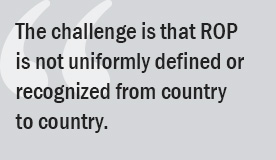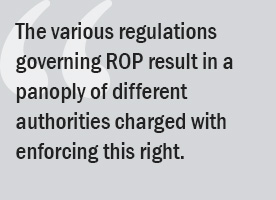Right of Publicity Committee Publishes State of the Law Survey Results
Published: February 15, 2019
Given the differences in recognition of and protection for rights of publicity (ROP) around the world, the Right of Publicity (ROP) Committee in the 2016‒2017 and 2018‒2019 terms undertook a survey of ROP statutes and/or case law in 16 countries and Guernsey, and now has compiled the results into a guide for practitioners to use in their legal practice. The ROP Committee provides highlights below, as well as additional survey information in a chart available here.
 ROP is generally understood or defined as a right that protects against the misappropriation of a person’s name, likeness, or other indicia of personal identity for commercial benefit, and it is available to different extents worldwide. The challenge is that ROP is not uniformly defined or recognized from country to country.
ROP is generally understood or defined as a right that protects against the misappropriation of a person’s name, likeness, or other indicia of personal identity for commercial benefit, and it is available to different extents worldwide. The challenge is that ROP is not uniformly defined or recognized from country to country.
ROP includes elements of copyright, trademark, and consumer law. These elements of
In addition, protections afforded to these rights arise under different bodies of laws in many countries, including statutory law, civil law, copyright law, common law, tort law, privacy law, and human rights law. Different authorities may enforce rights depending on whether ROP falls under civil or criminal law.
Other differences are the defenses and exceptions available, such as freedom of speech and freedom of reporting, and the remedies available, which may include fines, damages, and/or imprisonment; likewise, the term of protection of ROP and the possibility of asserting postmortem rights vary from jurisdiction to jurisdiction.
ROP intersects with trademark and copyright
The survey includes the following questions:
- Is there a recognized ROP?
- Is the right derived from the constitution,
statute (s), regulations, or common law? (Alternatively, a combination of one or more of these?)- If by
constitution , statute, or regulation, provide the citation and attach the relevant sections. - If by common law, provide a copy of the relevant case(s) along with a summary of each relevant case.
- If none of the above, is ROP created/enforced by combining other related statutes to create the right?
- Provide and summarize the leading case (or cases) defining ROP in your country.
- If by
- Whose rights are protected?
- What are the elements of ROP that are protected?
- Are postmortem rights recognized?
- If yes, for how long?
- What rights are recognized postmortem?
- What remedies are available for infringement/violation of ROP?
- What is the proper forum for raising complaints? Local vs. federal court? Administrative tribunals?
- What are the specific defenses/exceptions to ROP?
- What are other important factors/issues we should include?
The results of the State of the Law Survey suggest that although none of the jurisdictions surveyed has statutory laws that expressly regulate ROP, there is uniform recognition of a right that exists which protects against the misappropriation of a person’s name, likeness, or other indicia of personal identity for commercial benefit whether enforced under civil law, copyright law, common law, tort law, privacy law, human rights law, or a combination of these types of law.
Interestingly, ROP is related to personality rights in many jurisdictions. These rights are grounded in the relevant country’s constitution and give ROP the status of a human right. Another point of note is that laws are very similar in countries with significant differences in geography and culture (for example, China and Mexico).
 The various regulations governing ROP result in a panoply of different authorities charged with enforcing this right. For example, administrative panels, civil courts, and penal authorities may be involved in enforcing rights. The remedies available and the sanctions imposed also differ.
The various regulations governing ROP result in a panoply of different authorities charged with enforcing this right. For example, administrative panels, civil courts, and penal authorities may be involved in enforcing rights. The remedies available and the sanctions imposed also differ.
A comparison of ROP laws is useful for lawyers in both private practice and in-house who advise clients and their businesses on marketing materials and ad campaigns for traditional as well as online and e-commerce global platforms. It can assist them in advising on issues and solutions in this area by quickly finding high-level answers and resources about key considerations in the field of ROP.
With these survey results now published, the ROP Committee in the 2018‒2019 term will be providing additional survey information on eight countries.
The ROP Committee believes this work will serve as a platform for future INTA study of the nuances of the laws in many jurisdictions with a goal toward establishing best practices and minimum standards. Read more about the ROP Committee in this article in the INTA Bulletin.
Although every effort has been made to verify the accuracy of items in the INTA Bulletin, readers are urged to check independently on matters of specific concern or interest.
© 2019 International Trademark Association